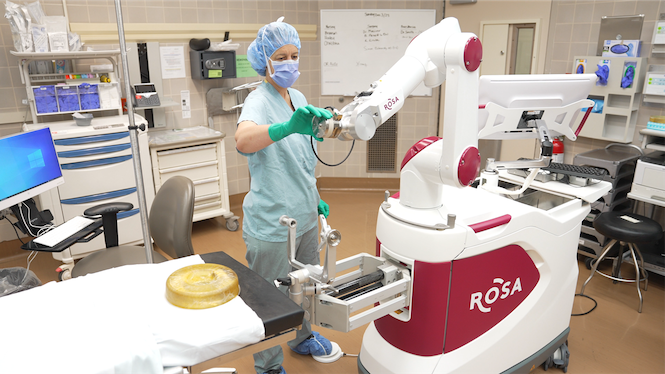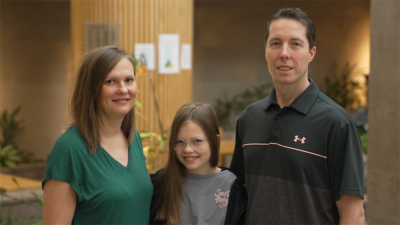
Epilepsy is the most common neurological condition in paediatrics affecting approximately one in one-hundred Canadian children.
For 11-year-old Makayla Douglass, epileptic seizures have been a part of her life since being diagnosed at the age of one. At its peak, Makayla would experience up to 30 seizures a day.
“Most of the seizure activity would happen in the evening and overnight hours,” explains mom, Jeannie Douglass. “She would go to sleep and then it would start, but then last summer it got so bad, she would have multiple seizures an hour throughout the night.”
The increased seizure activity was taking a toll on Makayla and her family, until she became the first paediatric patient in all of Canada to receive a new procedure called Radiofrequency Thermocoagulation, which took place at Children’s Hospital at London Health Sciences Centre (LHSC).
Radiofrequency Thermocoagulation is a minimally invasive procedure that uses radio waves, through electrodes to heat and destroy tissue in the areas of the brain that have been identified as the source of seizure activity.

“We were able to implant electrodes directly into Makayla’s brain to determine where the seizure activity was coming from, which we concluded was in a deep area of the brain called the insula, an area that is difficult to access for a surgical procedure” says Dr. Andrea Andrade, Director of the Paediatric Epilepsy Program at Children’s Hospital, LHSC.
“From there, we placed electrodes in the insula structure and through a controlled temperature procedure called ablation, in which the tissue in the area was warmed up, we were able to remove parts of the area causing the seizures.”
The minimally invasive procedure was a success and reduced Makayla’s seizures by 70 per cent the first time. Because it was so successful, the family opted to have the same procedure done a second time this past summer, which has resulted in Makayla being seizure free.
“It has given Makayla her life back,” says dad, Jeff Douglass. “It is incredible that we have this option here in London, it has changed our whole family and Makayla is happy and finally able to be a kid.”
The Radiofrequency Thermocoagulation was performed by using the ROSA One Brain, a state-of-the-art robotic arm, which was fully funded through donations to the Children’s Health Foundation. The ROSA is used in minimally invasive, robot assisted surgical procedures for epilepsy patients.
“This newer procedure, using the robotic arm, is less scary for patients and their families because it is all done through electrodes in a controlled manner. It is also minimally invasive with an amazingly fast recovery time, compared to an open skull surgery,” says Dr. Andrade.
It has been six months since Makayla underwent her second Radiofrequency Thermocoagulation procedure and she has not had a seizure since.
“It is still surreal, and we are sometimes wondering, will she have another one?” says Jeff. “But as each day goes by seizure free, we are looking into the future positively and happy for a bright future for Makayla.”

